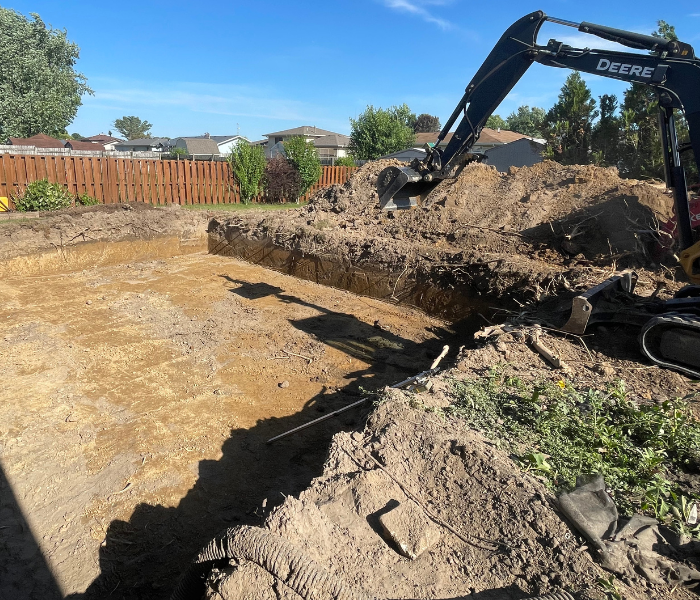Professional Septic Ohio - Relied On Septic Tank Experts in Ohio
Professional Septic Ohio - Relied On Septic Tank Experts in Ohio
Blog Article
Comprehensive Excavation Methods: Grasping the Principles for Success
The careful preparation, specific implementation, and thorough focus to detail needed in excavation jobs demand a thorough method that includes numerous fundamental elements. The true proficiency lies not just in understanding these principles but in effortlessly integrating them to navigate the complexities of excavation jobs with skill.
Recognizing Excavation Job Planning

The initial phase of any excavation task is the preparation stage, where critical choices are made that can dramatically affect the result of the project. Comprehending the project spending plan, timeline, and range restrictions is essential for creating an extensive excavation plan that makes certain the project's success.
One secret aspect of excavation project planning is the development of an in-depth timeline that lays out the series of activities, target dates, and landmarks. By very carefully thinking about all these elements throughout the planning phase, excavation projects can be performed effectively and effectively, leading to successful end results - lancaster trenching.
Dirt Evaluation and Site Analysis
Performing thorough dirt evaluation and site assessment is a critical action in the prep work phase of any kind of excavation task. Soil analysis includes establishing the make-up, framework, and homes of the soil at the excavation site. This details is critical for comprehending the dirt's bearing ability, wetness material, and capacity for erosion, which are vital consider determining the excavation methods and tools needed for the job.
Site assessment exceeds soil analysis and includes a more comprehensive assessment of the general site problems. This assessment includes recognizing any type of potential threats, such as below ground utilities, ecological problems, or unsteady surface, that can impact the excavation procedure. By thoroughly reviewing the website, job managers can create effective excavation techniques that focus on safety and security, effectiveness, and ecological protection.
Using advanced technologies like ground-penetrating radar, dirt sampling, and drone surveys can boost the accuracy and efficiency of dirt analysis and website analysis. Investing time and sources in these preliminary steps can ultimately conserve time and stop expensive delays or complications during the excavation process.
Equipment Choice and Utilization
Effective excavation projects count heavily on strategic equipment option and use to guarantee optimal performance and performance. Selecting the appropriate devices for the job is critical in optimizing efficiency and reducing downtime. Aspects such as the kind of soil, deepness of excavation, and project scope play a significant role in identifying the most appropriate tools for the task available.

In enhancement to picking the suitable tools, proper usage is vital to project success. Operators should be educated to manage the devices safely and successfully - excavating ohio. Routine maintenance checks and prompt repairs assist prevent malfunctions and make sure consistent efficiency throughout the project
Safety And Security Actions and Regulations Compliance
In the realm of excavation projects, prioritizing security actions and compliance with guidelines is extremely important to ensuring a safe and secure and legitimately audio functional environment. Precaution include a variety of practices, including conducting extensive site evaluations, implementing correct signage and obstacles, and supplying ample security training for all workers entailed in the excavation procedure. Adherence to policies, such as OSHA demands in the United States, makes sure that the excavation job satisfies the required criteria to secure employees, onlookers, and the surrounding atmosphere.

Tracking Progress and Adjusting Strategies
How can forecast supervisors properly track the improvement of excavation tasks and adjust their techniques appropriately to maximize results? Monitoring progression is essential for making sure that excavation jobs remain on track and fulfill target dates. Task supervisors can use various devices and techniques to track progress, such as everyday progress records, regular site inspections, and progressed monitoring modern technologies like drones and GPS tracking systems. By continually checking the job's development, supervisors can identify any type of potential delays or concerns early and take proactive measures to address them.

Conclusion
To conclude, grasping the basics of extensive excavation techniques is vital for the success of any type of job. By comprehending task planning, assessing dirt and site conditions, choosing proper devices, adhering to safety laws, and keeping track of development, task supervisors can ensure a reliable and smooth excavation procedure. Executing these strategies will certainly result in successful outcomes and decrease potential risks or setbacks throughout the excavation project.
The first stage of any type of excavation job is the planning phase, where essential choices are made that can dramatically influence the outcome of the job. Recognizing the project timeline, budget, and scope restrictions is crucial for creating a septic ohio comprehensive excavation plan that makes sure the job's success.
How can project supervisors properly track the development of excavation projects and adapt their strategies accordingly to maximize results? By very closely checking development and being willing to adapt strategies, job supervisors can boost the general success of excavation tasks.
By understanding job planning, examining dirt and website problems, choosing proper equipment, conforming with security laws, and monitoring progression, job supervisors can make certain a reliable and smooth excavation process.
Report this page